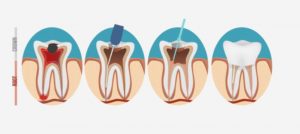What Are Important Facts to Know About Root Canals?
February 4, 2023

If the term “root canal” sounds scarier than an approaching tidal wave filled with sharks, it’s only because you need to learn more about this treatment. For whatever reason, root canal therapy garnered a negative perception in popular culture. Read on as your emergency dentist in Guilderland presents some facts about the procedure that should paint it in a better light.
When Is a Root Canal Needed?
Before going fact-finding, it’s important to understand what this treatment is about. A root canal is designed to alleviate dental pain originating from the interior of a troubled tooth. Inside your tooth is the pulp, which is the living portion comprised of blood vessels, connective tissue, and nerves.
When the pulp gets damaged or infected, significant discomfort can arise. This development also brings about the risk of an abscess. In cases like this, a root canal is often necessary to remove the pulp, soothe your pain, and save your natural tooth.
Telling the Truth About Root Canals
So, why are root canals not so bad after all? Check out some notable facts about the treatment:
A Root Canal Doesn’t Actually Involve Pain
Your emergency dentist will numb your tooth with a local anesthetic. He makes a very small opening atop your tooth, removes the infected pulp, and cleans and dries it thoroughly. He fills it with a plastic substance called gutta-percha, and then it won’t be long until he covers the site with a custom restoration like a dental crown. The root canal doesn’t cause pain – it relieves the pain you had before the procedure.
You’ll Be Taken Care of After Treatment
Your dentist wants to ensure your recovery from a root canal is a smooth, comfortable process and that you avoid infection. They will emphasize how important it is to move forward with a consistent oral health regimen. Your dentist will ask you to schedule a follow-up appointment to take X-rays and verify you a free of infection moving forward. The point is to ensure you never have any more trouble with this tooth now that it’s been saved.
Watch Out for Symptoms That Necessitate a Root Canal
Of course, these symptoms could be evidence of another issue, but a root canal may be needed if you experience:
- The presence of pus – a major infection indicator
- Gums that are inflamed, tender, or infected
- Pain only when you eat
- Pain that dissipates and returns
- Dull, steady pain
If you report one or more of these symptoms, your dentist will want to take X-rays and likely be suspecting you may be a root canal candidate.
You May Need a Root Canal Even If Your Tooth Doesn’t Hurt
If your tooth was hurting and the pain subsided, you should be fine, right? Not so fast. As tooth decay progresses, it eventually damages the nerve severely enough that it stops sending pain signals to the brain, making a person think the pain is gone.
But the infection could be more powerful than ever. To keep it from eventually spreading to your other teeth, gums, and jawbone, generally, the most effective way to treat it is with root canal therapy.
A root canal won’t always be the right answer for your toothache, but this treatment does have a very high success rate and usually lasts a lifetime. Now that you’ve learned more about this option, don’t wait to contact your dentist the next time pain or irritation pops up.
About the Author
Dr. Steven Oshins earned his dental doctorate from the University at Buffalo. During post-graduate programs, he studied under some of the top dentists in the world and now completes more than 100 continuing education hours annually. If you are interested in root canal therapy, he offers same-day emergency appointments, your dental insurance will be maximized, and CareCredit financing is available. You can schedule an appointment on his website, but if it’s an emergency, call (518) 356-5635.
No Comments
No comments yet.
RSS feed for comments on this post.
Sorry, the comment form is closed at this time.
